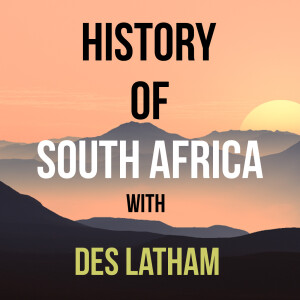
History of South Africa podcast
History

Episode 35 – The Mthethwa and Ndwandwe flex their muscles in what eventually will become known as Zululand
 2021-10-10
2021-10-10
Download
Right click and do "save link as"
This is episode 35 and we’re going to focus on the forerunners of the Zulu – the Mthethwa and Ndwandwe, the Qwabe and how they emerged in the region between the Tugela and Pongola rivers in northern KwaZulu Natal or what became known as Zululand.
By the first few centuries AD the migrations of farmers moving into the area between the Drakensburg, the Mzimkhulu river south of modern Durban and up to Pondoland took place.
There had been a steady growth of farmers here until the first phase of the development of more powerful kingdoms. The second phase saw the people there divide into numbers small patriarchal clans which lived alongside each other in relative peace although there were many minor incidents.
The third phase began with the rise of the Zulu Kingdom by around 1810. I’ll get to the third phase in future podcasts. The fourth phase of course was the arrival of the British traders from the Cape – and from the sea.
The Ndwandwe lived In the area around Nongoma in 1780s and 90s while to the south, between the modern town of Empangeni and straddling the black Mfolozi to the north lived the Mthethwa. To their west lived the Qwabe – and those were the ancestors of the people I grew up with in the Nkwalini valley on the Umhlatuzi.
As the struggle for dominance grew at the end of the 18th Century, it corresponded with the expansion of the major groups like the Mthethwa, Ndwandwe and the Qwabe – then later the Zulu into a variety of grazing types.
view more
By the first few centuries AD the migrations of farmers moving into the area between the Drakensburg, the Mzimkhulu river south of modern Durban and up to Pondoland took place.
There had been a steady growth of farmers here until the first phase of the development of more powerful kingdoms. The second phase saw the people there divide into numbers small patriarchal clans which lived alongside each other in relative peace although there were many minor incidents.
The third phase began with the rise of the Zulu Kingdom by around 1810. I’ll get to the third phase in future podcasts. The fourth phase of course was the arrival of the British traders from the Cape – and from the sea.
The Ndwandwe lived In the area around Nongoma in 1780s and 90s while to the south, between the modern town of Empangeni and straddling the black Mfolozi to the north lived the Mthethwa. To their west lived the Qwabe – and those were the ancestors of the people I grew up with in the Nkwalini valley on the Umhlatuzi.
As the struggle for dominance grew at the end of the 18th Century, it corresponded with the expansion of the major groups like the Mthethwa, Ndwandwe and the Qwabe – then later the Zulu into a variety of grazing types.
More Episodes
012345678910111213141516171819
Create your
podcast in
minutes
- Full-featured podcast site
- Unlimited storage and bandwidth
- Comprehensive podcast stats
- Distribute to Apple Podcasts, Spotify, and more
- Make money with your podcast
It is Free
- Privacy Policy
- Cookie Policy
- Terms of Use
- Consent Preferences
- Copyright © 2015-2024 Podbean.com





